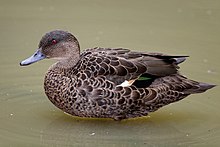Chestnut Teal
| Chestnut Teal | |
|---|---|
 | |
| Male | |
 | |
| Female | |
| Conservation status | |
| Scientific classification | |
| Kingdom: | Animalia |
| Phylum: | Chordata |
| Class: | Aves |
| Order: | Anseriformes |
| Family: | Anatidae |
| Subfamily: | Anatinae |
| Genus: | Anas |
| Species: | A. castanea |
| Binomial name | |
| Anas castanea (Eyton, 1838) | |
The Chestnut Teal (Anas castanea) is a dabbling duck found in southern Australia. It is protected under the National Parks and Wildlife Act 1974.
Description
The Chestnut Teal is darker and a slightly bigger bird than the Grey Teal.
The male has a distinctive green coloured head and mottled brown body. The female has a brown head and mottled brown body. The female is almost identical in appearance to the Grey Teal.
The female Chestnut Teal has a loud penetrating "laughing" quack repeated rapidly nine times or more.
Distribution and habitat
The Chestnut Teal is commonly distributed in south-eastern and south-western Australia, while vagrants may occur elsewhere. Tasmania and southern Victoria are the species’ stronghold,while vagrants can be found as far north as New Guinea and Lord Howe Island.
The Chestnut Teal prefers coastal estuaries and wetlands, and is indifferent to salinity. This bird is an omnivore.
Breeding
Chestnut Teals form monogamous pairs that stay together outside the breeding season, defend the nest site and look after the young when hatched. Nests are usually located over water, in a down-lined tree hollow about 6–10 m high. Sometimes nests are placed on the ground, among clumps of grass near water. The young hatch and are ready to swim and walk within a day.


No comments:
Post a Comment